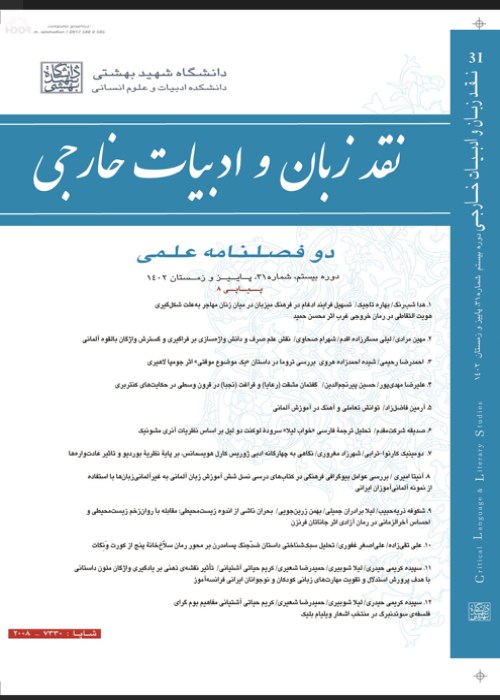An Ecocritical Reading of Vladimir Nabokov’s Pnin
Author(s):
Article Type:
Research/Original Article (دارای رتبه معتبر)
Abstract:
Introduction
Environment and its problems is the subject of study for many contemporary thinkers. Indeed, an environmental study is a field where humane and natural sciences, in the shape of man and nature, are combined. Ecocriticism is a branch of literary criticism which deals with the relationship between literary work and its natural surroundings. One of the most important branches of ecocriticism is deep ecology. Of eight major principles defined by its prophet Arne Naess, the first and the most important one is the equality between human and nonhuman animals. This means they believe each species, big or small, has its own innate value and importance apart from being in contact with human or not. Therefore, an animal should be evaluated as a human character.
Background Studies
The voices of many critics are heard who claim that Pnin is the ‘warmest’, the ‘most approachable’, and ‘the most gentle and humane of all Nabokov’s novels’ (qt. in Barabtarlo 40), or ‘most amusing’, ‘most poignant’, ‘most straightforward’ (Boyd 271). What all these critics have in common is the part they have dealt with the appearance of squirrel, so that Leona Toker calls squirrel as ‘"one of the most striking of these is that of the squirrels" (27). Boyd believes that Pnin, as its name suggests, is the story of pain and squirrel ‘Seems to intimate a number of possible metaphysical answers to the problem of human pain: a patterner of human lives, a designer of fate’ (282). W. W. Rowe comments that squirrel is a symbol for Mira’s soul who is flying in the novel and sojourns with Pnin, that is why it is represented everywhere through the animal or the connotations. Paul Grams suggests that the ‘reddish object’ might be ‘symbolically’ Pnin’s suffering heart (201). To Eric Naiman, the squirrel is another means for depicting perversion, ‘the fundamental principle of poetic perversity so dear to Nabokov’ (89). Siggy Frank claims that this animal’s appearance in the novel is the remembrance of the Nazi concentration camp which he believes also ‘recur unexpectedly in Lolita’ (12). Martha Pellardy comments on the Pnin’s identification with squirrel in two aspects, Pnin’s first love’s cruel murder in Nazi concentration camp many years ago whose dead soul still sojourns with Pnin in the shape of the squirrel as mentioned by Boyd, and Pnin’s similarity with Van Eyck’s painting.
Methodology and Design
Of the eight principles Arne Naess, the founder of deep ecology, has defined for deep ecology, the equality between human and animal is the most important one which overshadows the rest. The research in hand has criticized this novel based on ecocriticism and particularly deep ecology. Pnin, the protagonist of the story, is an exiled Russian professor of an American university and the only benign living creature that comes to his life now and then is a squirrel. The presence of squirrel is so recurring and significant that it tacitly represents the author’s special purpose in making such vicinity. Beside similarities between the main character of the novel and the squirrel, the novel, in general, has a similar structure to the shape and life of the animal. In this article, first the theoretical framework of the study including ecocriticism and deep ecology are defined, then squirrel’s life-style, in the city and in the jungle, are depicted scientifically. The last part of the study includes the analysis of the researcher on the novel to investigate the complicated structural, as well as characterization, similarities between Pnin and squirrel.
Conclusion
This article shows how Nabokov has selected a structure based on a character whose most distinguished vicinity is to a squirrel, although this nearness does not mean being the same with a squirrel or using the animal at the service of human character. Rather, it means how they are presented equally and for their own innate values. The article comes to the ultimate conclusion that Pnin is an example of Nabokov’s respect to nature and equality, he believed, between human and animal which is also seen in his letters and interviews. This is similar to the principle deep ecology penned down during the same years Nabokov was handling Pnin.Keywords:
Language:
Persian
Published:
Critical Language & Literary Studies, Volume:16 Issue: 22, 2019
Pages:
119 to 142
magiran.com/p2008822
دانلود و مطالعه متن این مقاله با یکی از روشهای زیر امکان پذیر است:
اشتراک شخصی
با عضویت و پرداخت آنلاین حق اشتراک یکساله به مبلغ 1,390,000ريال میتوانید 70 عنوان مطلب دانلود کنید!
اشتراک سازمانی
به کتابخانه دانشگاه یا محل کار خود پیشنهاد کنید تا اشتراک سازمانی این پایگاه را برای دسترسی نامحدود همه کاربران به متن مطالب تهیه نمایند!
توجه!
- حق عضویت دریافتی صرف حمایت از نشریات عضو و نگهداری، تکمیل و توسعه مگیران میشود.
- پرداخت حق اشتراک و دانلود مقالات اجازه بازنشر آن در سایر رسانههای چاپی و دیجیتال را به کاربر نمیدهد.
In order to view content subscription is required
Personal subscription
Subscribe magiran.com for 70 € euros via PayPal and download 70 articles during a year.
Organization subscription
Please contact us to subscribe your university or library for unlimited access!


